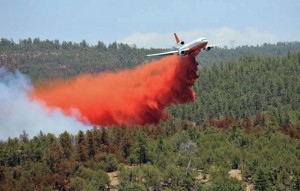
Credit: Wildfire Today
Governor John Hickenlooper’s opposition to Colorado having its own aerial fleet to fight wildfires has been well known with Hick stating back in January he was not in favor of one. But, last year, in light of the many devastating wildfires Colorado has had over the last few years, Republican state Sen. Steve King initiated a report on the costs and benefits of Colorado having its own aerial fleet to rapidly respond to wildfires. Yet, just 24-hours before the report was to be released Alan Salazar, Hickenlooper’s chief political strategist, had this to say to Eli Stokols at KDVR:
“There’s no way his bill is going to pass,” said Alan Salazar, Hickenlooper’s chief strategy officer. “It’s too prescriptive. We’re glad to work with him, but it’s going to have to be on something that makes sense fiscally and that draws on the information in the report that he himself commissioned.”
This led many to believe the report contained nothing positive for King’s position. Imagine the surprise when the report was finally released and not only did it recommend some sort of aerial fleet for Colorado, but went even further and requested more planes and helicopters than even King himself was asking for (via The Durango Herald).
This year, King is sponsoring Senate Bill 164, which calls for the state to buy or lease three helicopters this year and four heavy air tankers next year – fewer aircraft than Cooke recommends in his report. [the Peak emphasis]
Not only does the report recommend more planes than King was envisioning, but the price of King’s bill looks downright spendthrift as $8 to $12 million in light of the report’s figure of $33.6 million.
Even at $33.6 million, it seems a bargain as many long-term consequences beyond the immediacy of a family home burning down come more into focus. The fire in Waldo Canyon will keep the Flying W Ranch closed for yet another summer not because of fire danger, but flood danger.
Hick’s pet project of reducing DMV wait times from 60 minutes to 15 minutes is certainly the cutesy thing that he can tout in front of uninformed voters come election time, but at a price tag of $90 million, we would have more than enough to put Colorado in the best position possible going into this fire season.
